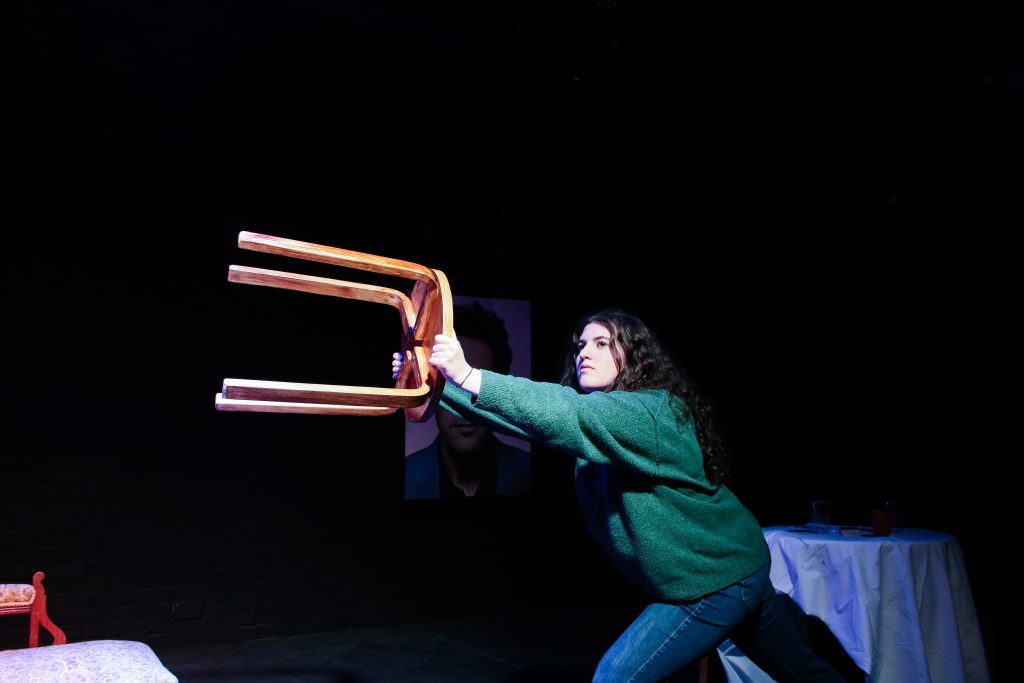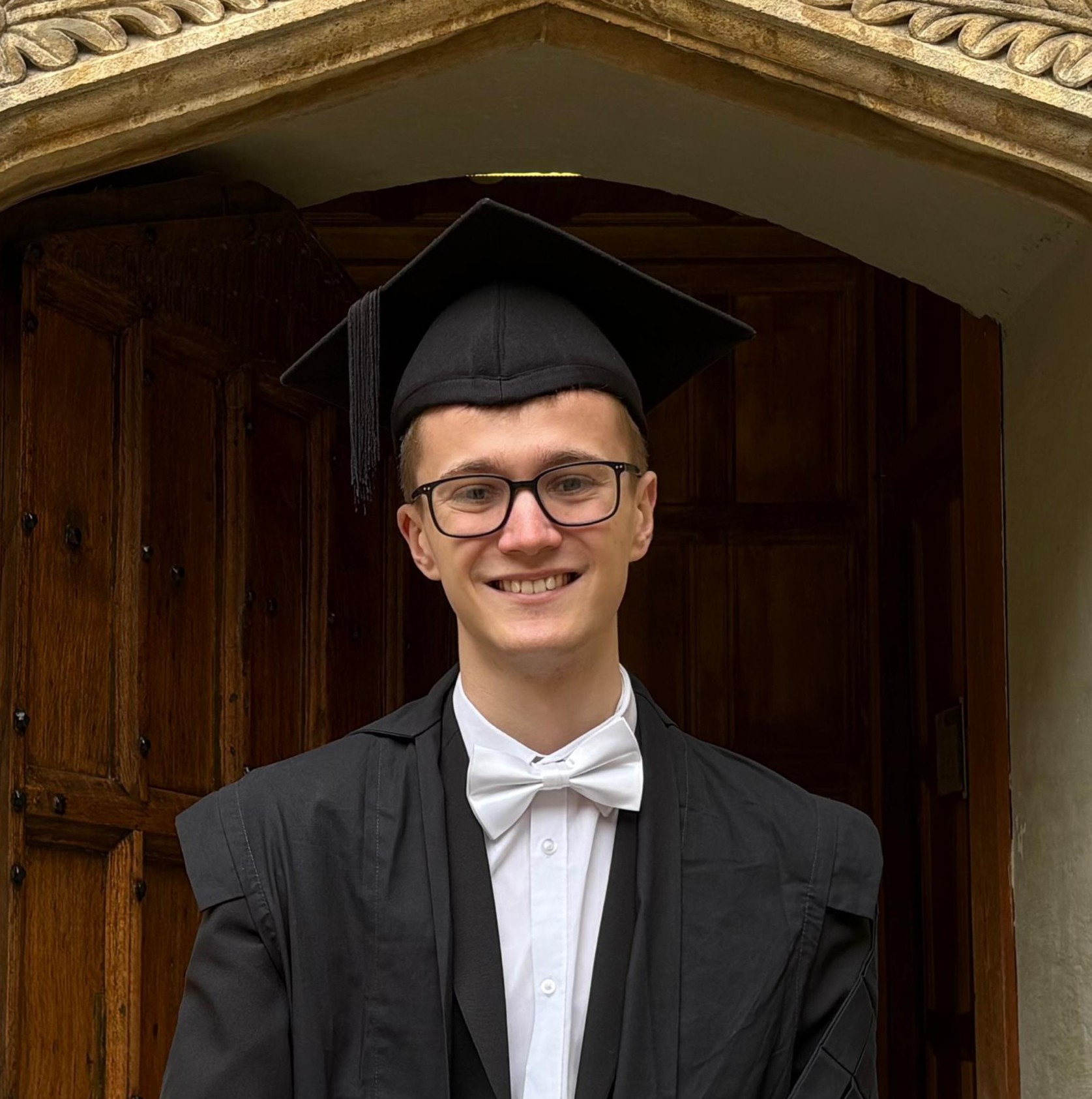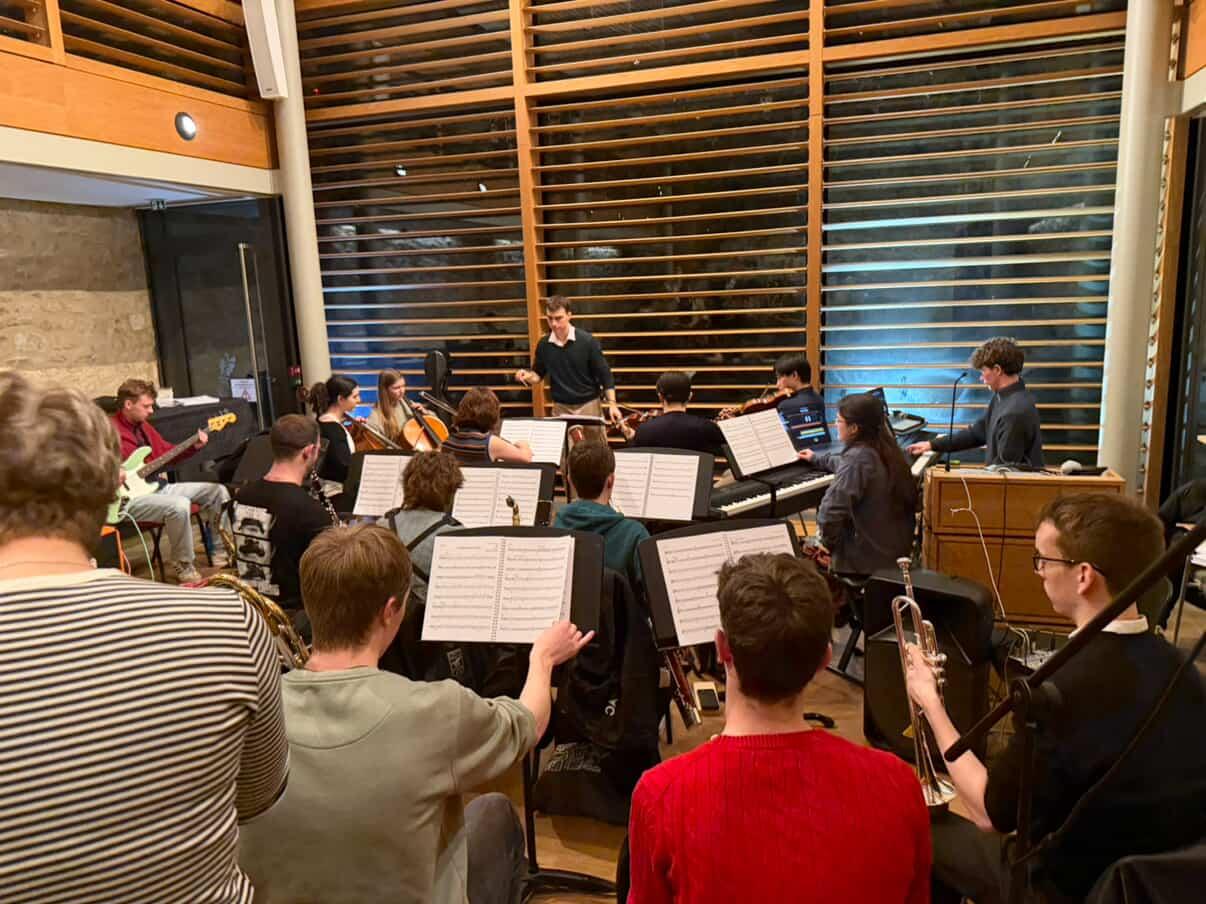Fresh from the Fringe, writer Oisin Byrne (English & Spanish, 2021) and director Eva Bailey (English & French, 2021) reflect on taking meta-comedy Unprofessional from a sold-out Oxford run to the Edinburgh Fringe. Unprofessional playfully satirises actors, audiences, and the industry, while holding onto the real graft behind the craft.
In this Q&A, the writer/director duo talk influences, auditioning for “carnage,” and what they learned from different audiences each night.
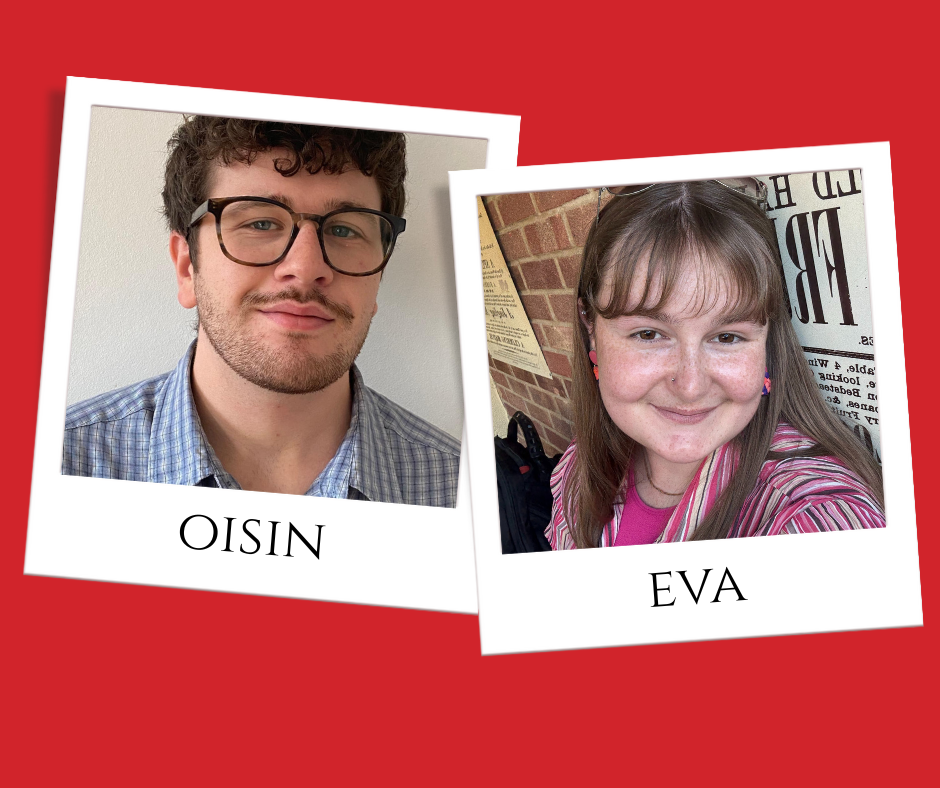
Can you describe the Fringe in three words?
Exciting, unforgettable, hilarious!
Oisin
Unpredictable, riotous, incredible.
Eva
Your play, Unprofessional, pokes fun at actors, audiences, and even itself. What first sparked the idea?
Oisin: I’ve always loved media which satirise the people who make that media in the first place: plays like The Play That Goes Wrong and Noises Off, TV shows like 30 Rock, and films like Singin’ in the Rain and Hail! Caesar. It was only once I studied a Modern and Contemporary Theatre paper in my fourth year that I saw the potential for this being taken to darker, more form-breaking places, with plays like The Writer by Ella Hickson and The Author by Tim Crouch. Unprofessional is an attempt to marry a more satirical, light-hearted approach with some darker experimentalism – we wanted audiences to feel genuinely disturbed by the prospect of the play they are watching genuinely falling apart, before laughing at the eventual realisation that everything is intentional and scripted.
Guy, your protagonist, is both hilarious and tragic. How did you balance comedy with an honest take on the struggles of being an actor?
Oisin: This wasn’t too difficult, as most of the day-to-day situations experienced by an actor are kind of ridiculous when you strip them out of context. Things like auditions, self-tapes, shoots for yoghurt adverts, and community theatre are ripe with comedic potential. I also have quite a few friends I met at uni who are entering the world of acting (including one who I lived with last year), and so being around them helped with some inspiration. Thankfully none of them are anything like Guy, though: he’s more of an amalgamation of all the worst things I’ve heard about other actors, whether it be amateur level or Hollywood.
Eva: In terms of staging the play, striking that balance was helped enormously by our wonderful cast. During rehearsals on the lead-up to Edinburgh, I worked a lot with Aaron (who played Guy) to draw out Guy’s exasperation that everything around him is falling to pieces. I really wanted Guy (and later on in the play, Aaron himself) to feel like a real person – he is, largely, a caricature, but I think both the comic and tragic elements of the play hinge on audiences believing that this is an actor who truly cares about the work he’s doing, even though a lot of it is of questionable quality. Sure, Guy’s a diva, but he’s a diva with a genuine passion for his craft: although much of the script is very tongue in cheek, I think Unprofessional still sheds light on how much actors have to graft to break into “the industry”.
You’ve cited Tim Crouch and The Play That Goes Wrong as inspirations; how did their influence show up in your process?
Oisin: When I began writing the play, it was going to take a much darker route, and so the Tim Crouch influence was stronger initially. His play The Author places the audience on either side of a writer and group of actors who describe the unusual and eventually horrifying process of putting on a particularly dark play, and implicates the audience very much in all of this through a Q&A style structure. From there, I was intrigued by audience culpability, but particularly within the realm of amateur theatre. If an audience member sits down to watch a student play and it turns out to be genuinely woeful, falling apart due to a lack of rehearsal, forgotten lines, and temperamental actors, what should they do? Do they stay to relish in the failure? Do they fake a coughing fit to escape? Or do they heckle to break the barrier between them and the actors? With amateur theatre, these questions are inherently more present in an audience member’s mind, and so I wanted to force audiences to confront them by staging a play that, initially, appears to be genuinely going wrong.
However, as I started writing some scenes – in particular, a scene where Guy has a breakdown and hallucinates Matt Damon – I realised that the whole thing didn’t have to be dark and uncomfortable like Crouch’s theatre. So I wrote Unprofessional such that, while the first few staged events of the play ‘going wrong’ may seem credible and create an unsettling atmosphere, these mistakes become gradually more ridiculous and comedic. This way, the whole audience is guaranteed to be onside with the play’s central conceit by about halfway through, and experience a journey from the discomfort of plays like Crouch’s towards the slapstick farce of shows like The Play That Goes Wrong.
Eva: One of our biggest challenges when approaching Unprofessional from a directorial standpoint was how on earth we were going to run auditions that tested an actor’s suitability to deal with genuine carnage onstage. Like The Play That Goes Wrong, the vast majority of Unprofessional is tightly scripted, but we wanted the moments that went “wrong” to be as believable as possible, particularly in the opening scenes. There are several moments, too, where Unprofessional asks actors to think on their feet and improvise – I’m thinking in particular of a scene towards the end of the play, where one of the actors is so woefully anxious that they are turfed offstage and replaced by an unsuspecting audience member. So, when we were running second round auditions after receiving a wealth of brilliant self-tapes, I realised we needed to replicate the carnage of the play “going wrong” in the audition room itself. We asked actors to perform monologues while being interrupted at various moments by weird noises, we set off phone alarms in the middle of poignant moments, and almost all of the auditions ended up with me chasing actors around the room while they attempted to perform a scene (which sounds much stranger than I intended now that I’m typing it out…I promise everyone was on board!). Although unconventional, the audition process produced some real improvisational gems, and ended up closely mimicking multiple scenes in the play – and, it goes without saying, we cast four brilliant actors who took the weirdness of it all in their stride.
The play is described as “meta-comedy.” What does that mean for you, and what should audiences expect?
Eva: We had a great review from UK Theatre Web that I think perfectly describes the audience experience of watching Unprofessional. The reviewer said that he was confused and ready to walk out after the first few lines, but before he knew it the show began twisting and turning in new directions, with hilarity and chaos growing in equal measure, until he was laughing out loud and fully onboard with the absurdity of it all. Having watched the play over 25 times now, I still love the moment in every performance when the audience breathes a sigh of relief that everything was planned all along.
I still love the moment in every performance when the audience breathes a sigh of relief that everything was planned all along.
Oisin: ‘Meta’ can often be a bit of a contentious and vague label to slap onto something, but I love it because of how wide the scope is. Unprofessional is ‘meta’ in many senses; firstly, in that it refers to itself as a performed piece, being a play about itself going wrong; secondly, in that it’s a piece of theatre about the act of making theatre; and finally, in that the play’s superficial narrative before anything ‘goes wrong’ explores Guy, a character trying to make it in the theatre industry.
The play had a sold-out run in Oxford; what did you learn from that experience that you took to Edinburgh?
Oisin: The Oxford run was super fun, and thanks to great audience numbers and reviews we got to learn really important things about the show. On different nights, the penny-drop moment – when audiences realised that everything they were watching was scripted – happened at different points. Larger, younger audiences often felt more comfortable laughing through purposefully awkward moments, and so the tone of the play shifted towards out-and-out farce more quickly on those nights. I think learning to lean into the riskiness of the show, and embrace that every night was going to be very different, was one of the key things we took to the Fringe. Once we did this, some hilarious stuff started happening that even we couldn’t have predicted – one night a Front of House member at our venue was in the audience, and at the (very-much scripted and planned) moment when Eva walks in late as a ‘disruptive audience member’, he started having a go at her and trying to usher her out of the theatre, not realising it was part of the show! Watching our actors improvise with that and seeing him realise that he had become embroiled in the chaos was one of my favourite moments of the whole festival.
Learning to lean into the riskiness of the show, and embrace that every night was going to be very different, was one of the key things we took to the Fringe.
Eva: As Oisin says, it was just great to have so much feedback, and so many wonderful reviews. The Fringe is a beast – there were almost 4,000 shows there this August – so to have pre-made marketing material that we could use to get bums on seats in Edinburgh was also priceless. We also took on board suggestions from friends and reviewers to help improve the show; the great thing about working on new writing is that you have licence to change the script as and when you like so, even in Edinburgh, our wonderful cast were able to make tweaks every night to refine the show right up until the end of the run.
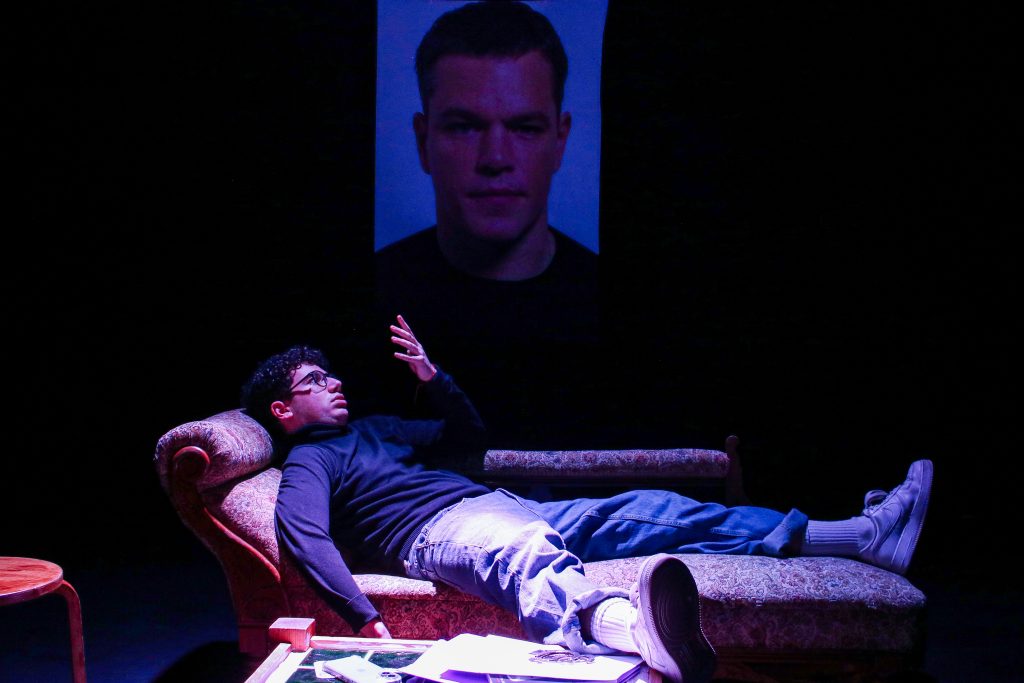

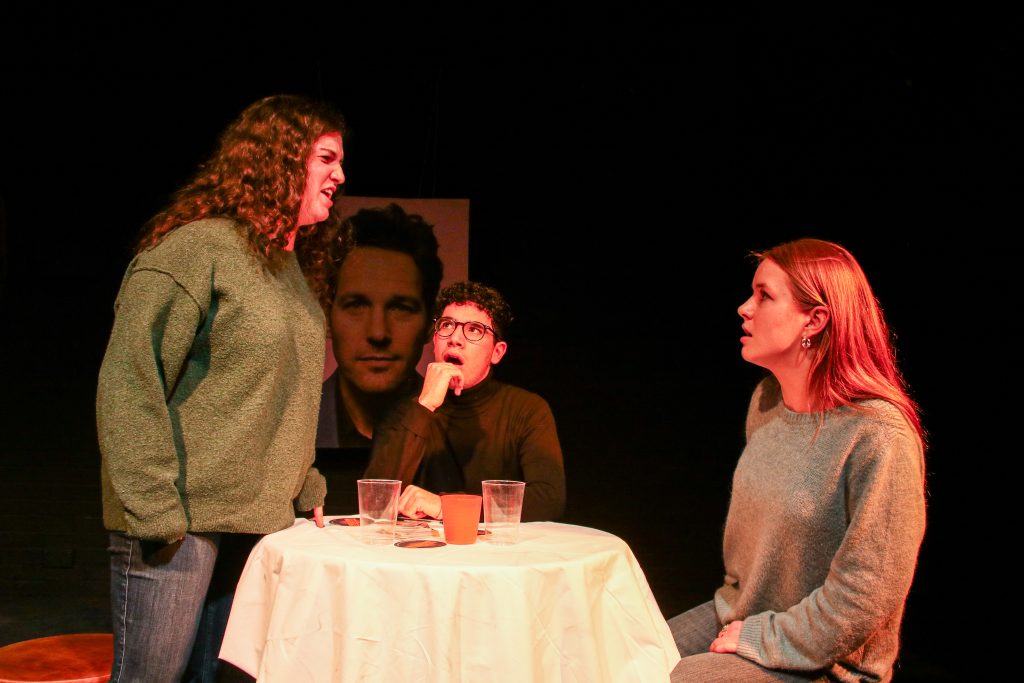
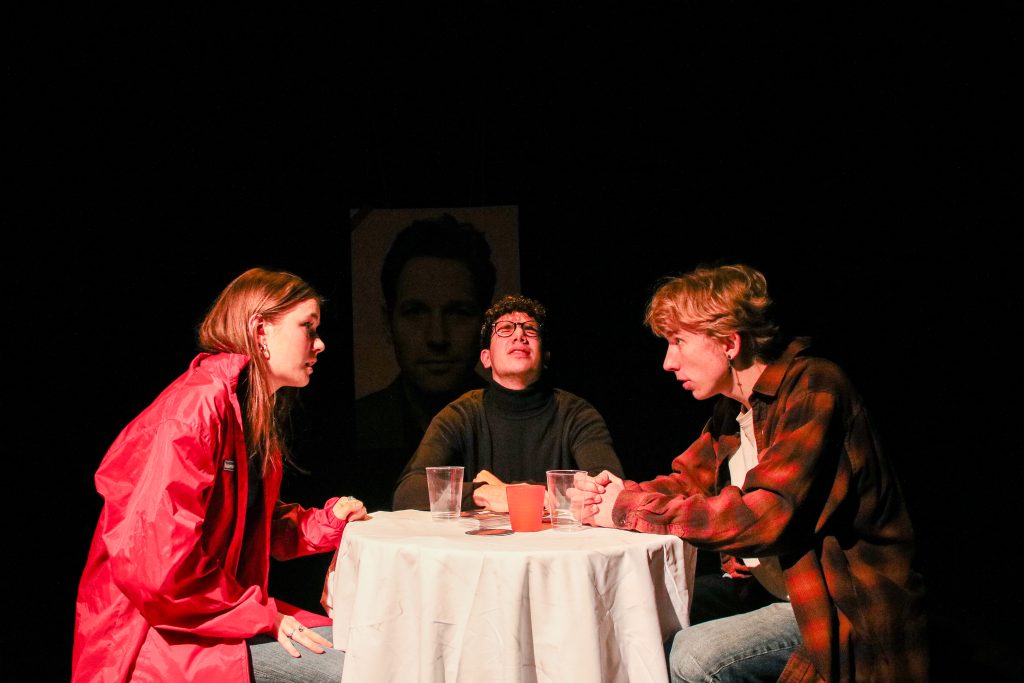
Production photos by Coco Cottam
Oxford has such a strong student theatre scene. How did that environment shape you both?
Eva: I headed straight for the OUDS stand when I visited the Freshers’ Fair back in my first year: I was brought up on a diet of amateur theatre, so I knew that I wanted to continue performing on stage when I came to university. I successfully auditioned for my first musical (Sweeney Todd at the Oxford Playhouse) in Freshers’ Week, and since then I’ve been lucky enough to perform in so many fantastic productions. Some of my favourite roles include Audrey in Little Shop of Horrors in the first Queen’s College Garden Musical post-pandemic, Olive in The 25th Annual Putnam County Spelling Bee, once again at Queen’s, and Cinderella in Into the Woods at the Oxford Playhouse again, the opening performance of which was just two days after I submitted some of my coursework for my English finals.
What I didn’t expect, however, was the passion I’d gain for working behind the scenes while at Oxford. The amazing thing about drama here is that there is just so much of it – there are at least four shows happening every week during term-time, which naturally generate an enormous amount of opportunities. Buoyed by talented friends, and itching to put my screen time to good use, I’ve also dabbled in marketing shows: I was the co-marketing manager for Oisin’s first play, Blue Dragon, and last year, I marketed the OUDS National Tour of The Taming of the Shrew. When Oisin told me about Unprofessional, I knew that it would make a fantastic first venture into directing, and I’ve loved every second of it. Although he won’t tell you this himself, Oisin truly is a fantastic writer, and it’s been such a joy to work with him on bringing his script to life. The opportunities I’ve been afforded within the Oxford drama scene are unique, and utterly priceless – where else can you submit your idea for a play two minutes before the deadline, then put it in front of paying audiences just a few weeks later?!
The opportunities I’ve been afforded within the Oxford drama scene are unique, and utterly priceless – where else can you submit your idea for a play two minutes before the deadline, then put it in front of paying audiences just a few weeks later?!
Oisin: Eva was definitely a lot more into theatre than I was when we both started at Oxford. It was thanks to making friends with her (through studying English together at Queen’s) and other theatre-y people at Queen’s that I was introduced to the world of OUDS (Oxford University Drama Society). Even then, my involvement only stretched as far as hearing about shows and going to see my friends perform until Trinity of my second year, when I was Assistant Director of the Queen’s Garden Musical, The 25th Annual Putnam County Spelling Bee. Aside from being in the ensemble of a couple shows at school, that was my first full foray into theatre, and I absolutely loved it! It helped that, being a Queen’s show, it was directed by one of my good college friends, Harry, as well as having Eva and many other friends on the cast and crew. Doing such a light-hearted show with wonderful people gave me a great introduction to the world of student theatre, and so early in the rehearsal process I felt comfortable enough to share an idea for a play I had with Harry. He encouraged me to write it so that we could put it on together, and that became my first play, Blue Dragon! That way I ended up going from zero involvement in theatre to doing two shows within the space of a few weeks. Now, I can’t imagine my time at Oxford without doing theatre.
How did you balance theatre and your academic work?
Oisin: I was fortunate enough to work on two shows during Trinity of second year, probably the least work-heavy term of my entire degree, then write another show during my year abroad when I had lots of free time, and finally work on another couple of shows, including Unprofessional, in my final year. This meant that I only really had to contend with this balance in Michaelmas and Hilary of fourth year, though this was admittedly difficult given that I had three pieces of English coursework due over the same course of time as writing, rehearsing, and putting on Unprofessional. I won’t say I always managed a good balance, but I stayed relatively on top of things by keeping academic work to daytime and weekdays, and any playwriting or show admin to weekends and spare pockets of time here and there. When it came to rehearsing Unprofessional, it really helped having Eva alongside me, and our friend Luke (also Queen’s!) producing. Not only are Eva and Luke organisational wizards experienced in all things theatre, but we all studied Modern Languages so our timetables were pretty similar, meaning we were able to coordinate putting the play together in just under three weeks during the middle of Hilary term. This was also thanks to our extremely lovely and co-operative cast, who brought energy, commitment and fun to rehearsals, meaning we never had to stretch ourselves too much time-wise.
Eva: Much to the initial dismay of some of my tutors, I dived head-first into theatre at Oxford, and was involved in at least one show per term from the moment I arrived. However, despite having professional ambitions in the theatre industry, I firmly believe that student theatre should remain a fun addition that complements a degree rather than detracts from it. I was the Access and Outreach Rep for OUDS during my final year, fuelled by the conviction that good student theatre can be put on without taking over your life, if students (particularly those who haven’t had access to much theatre pre-university) are given the tools and the knowledge necessary to create a show. Theatre is a space of play – we are literally playing pretend in front of other people – and I always tried to remember that in the moments when it started to feel stressful. In terms of Unprofessional, as Oisin says, it worked because we were such a good team. We also had our friend Luke producing the show for us in Oxford, and we were able to enlist various friends to do marketing shoots and help us with the lighting and sound design, which made the whole thing a million times easier. I’m kind of looking forward to talking to Oisin about things other than budgets and air beds and easels to hold giant posters of Matt Damon and Paul Rudd, though!
Theatre is a space of play and I always tried to remember that in the moments when it started to feel stressful.
What’s next for you?
Eva: I’m very lucky to be coming back to Oxford in October to pursue a Master’s in French, with a focus on French theatre in particular. It was while Oisin and I were studying a contemporary theatre paper together in our fourth year that I realised I wanted to continue delving deeper into the theatre world academically, and I haven’t (yet!) had chance to do so from a French perspective, so I’m really looking forward to it. I have a particular interest in the practice of theatre translation – which was the topic of my undergraduate dissertation – so I’d love to work on translating one of the French plays that I love in the near future. I’m still not entirely sure of the exact direction that my career will take, but it will certainly be theatrical in some capacity.
Oisin: Aaaarrgghh. Very scary. To be honest, I’ve spent so much of the last few months thinking about and preparing for finals, and then the Edinburgh Fringe run of Unprofessional, that I haven’t devoted as much time as I’d like to applying for jobs or preparing for the future. I’m keeping myself busy and financially afloat with a couple of part-time jobs while applying for things. In terms of playwriting, I don’t want it to just stop there, so I’m sending the script of Unprofessional to some smaller theatres in London, as well as looking at some playwriting residencies. I’ve also just begun writing my first full-length play, which, once it’s done, I can hopefully send to theatres too. I’m not too concerned or naive about immediately being able to enter a career in theatre, so I’m happy to make a living doing anything else for a while, and perhaps eventually save up for a Master’s in Playwriting.
Can you recommend a play or show (other than Unprofessional of course!) that has stayed with you in some way / contributed to your love of theatre?
Oisin: I’m obsessed with so many shows and writers, but if I had to stick to one I’d say Appropriate by Branden Jacobs-Jenkins. I studied it in my fourth year, and while it might not have had a direct influence on my writing, to me it’s the perfect modern play. It’s a beautiful read due to Jacobs-Jenkins’ command over prose in his stage directions and his depth of character, but it’s also incredible to watch because of the stunning sound design and disintegration of the set built into the script. It’s also a devastating, unsettling comment on American race relations, guilt, and collective ignorance, all whilst being outrageously hilarious. Jacobs-Jenkins has a unique ability to let very dark themes and brilliant comedic moments exist alongside each other in his plays, so for that reason I’d recommend Appropriate or anything else he’s written. Also The Book of Mormon and Into the Woods.
Eva: I’m going to indulgently allow myself to pick three shows (though this list could easily go on forever!). As a musical theatre lover first and foremost, I have to mention Shrek The Musical. It was the first musical I ever saw live, because it came on tour to Birmingham, and I can just recall the warmth that spread through my chest when Shrek, Donkey, and Fiona hit the gorgeous three part harmony at the end of the first act. It might sound like a silly premise for a show – and it definitely is – but Shrek is genuinely a fantastic musical.
A show that I think about frequently is Moderation. It was the first show I saw at the Fringe in 2023, when I was up performing with the new musical Dead Man’s Suitcase, which started life in the same Oxford theatre as Unprofessional. The show was about Facebook moderators, who were (and in many cases still are) forced to watch content that is flagged as inappropriate by users which – as you might imagine – is often brutal and deeply troubling. The show was just impeccable, and it made me realise what a special place the Fringe is – I got to see that show for free on a random Friday at 4pm. As I’m about to embark on a year of studying French theatre, it would be remiss of me not to mention something French. A French play that stayed with me is Joël Pommerat’s Contes et Legendes, which I saw in Paris during my year abroad. Ostensibly dealing with adolescence and coming-of-age, it made me think a lot about bodies on stage, because you had women playing men who were themselves playing robots. That layering is fascinating to me, and forms a large part of what I want to unpack in the year ahead.
